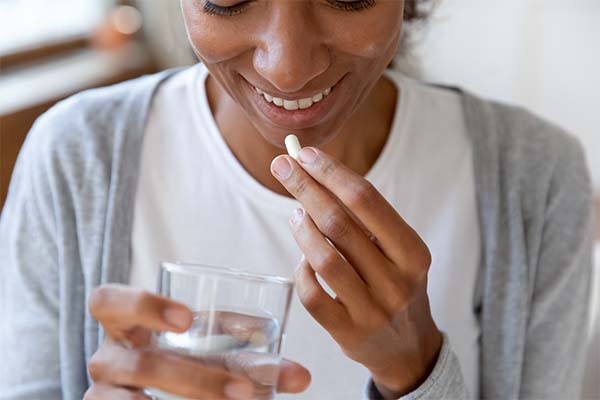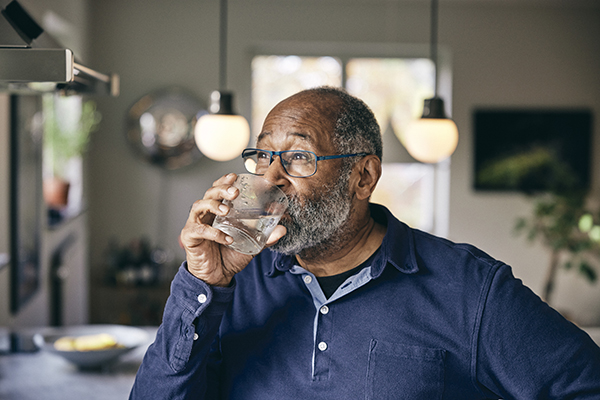Easy Ways to Improve Your Hydration
Easy Ways to Improve Your Hydration
Hot summer days can make it easy to get dehydrated, but proper hydration isn’t just something we should be thinking about when it’s hot. Did you know that you lose two and a half, to three cups of body fluid in a day just by living? And, if you're exercising in the heat or even just sweating from being outside, you can lose additional body fluid.
As you lose body fluids, you also lose precious minerals and electrolytes needed to keep your body functioning properly. When we think of hydration, we naturally think of water. But water is really only a vehicle for the minerals it contains, and these minerals are actually what help hydrate our bodies.
Minerals for Hydration
Minerals can be broken up into two categories when it comes to the amount our body needs: trace minerals and macro minerals.
Trace minerals are minerals that your body only needs in small amounts. Examples include iron, manganese, zinc, selenium and copper.
Macro minerals are minerals that your body needs in larger amounts (200 mg or more daily). Examples include calcium, magnesium, potassium and phosphorus. Some minerals, especially macro minerals, are also important as electrolytes.
In simple terms, electrolytes are minerals that carry an electrical charge. Among other things, they help ensure proper muscle contraction, so you don’t suffer with cramps (including night cramps), spasms or twitches. They also assist with water balance within the cells, which helps eliminate toxins and regulate the body.
Water for Hydration
While drinking water is the most obvious way we can stay hydrated, our drinking habits and the kind of water we drink also plays a significant role in maintaining proper hydration. Consider this: we're designed to drink ground water, spring water, creek water and river water. But most of us wouldn't dare to drink the water from a local creek, and we'd be right not to!
All too often, we are even scared to drink water from the faucets in our own homes. We are scared of our environment, so we drink bottled, filtered, distilled or reverse-osmosis water. We feel more comfortable with these "clean" water options. But remember: while these types of water do remove the contaminates often found in creek and river water, they're not just removing the unwanted things; they also end up removing many, if not all, of the minerals too.
So, it's important to consider remineralizing your water or adding electrolytes to your regimen to give your body a boost to stay properly hydrated. Additionally, there are several simple things you can do to incorporate more water into your daily routine.
Consume the right amount of water daily. The long recommended norm for daily water consumption has generally been to drink at least 64 ounces of water. More recently, some experts have begun to suggest drinking more. But, since our individual water needs can vary from person to person, a better guide for how much water you personally need is to take your body weight and divide it by two. That figure will give you the number of ounces of water you should be drinking as a minimum daily.
Just remember that strenuous activities, such as exercise which causes you to sweat a lot, will make it important for you to consume enough water to make up for what you're losing.
Water Enhancers
Decide how you best like your water. Experiment with how you prefer your water to help maximize the amount of water you'll drink. Determine if you like your water at room temperature or if you prefer it cold; with or without ice. Perhaps you need/want a little something in your water to give it some flavor.
If this applies to you, consider adding cucumber slices or a slice of your favorite citrus fruit to give your water a more enjoyable taste. While a slice of lemon may seem a more traditional fruit option for water, adding berries and other fruit can also provide a refreshing splash of flavor.
Freezing fruit or flavored electrolyte products in ice cubes can not only give you a time release of taste, but also help keep your water cold if that's your preference. And, don’t be afraid to experiment with a sprig of mint or even rosemary! It may surprise you what satisfies your water taste preference.
Hydration Tips
By adding minerals to your water, you can not only enhance the taste, but they'll help make your water work better towards your hydration needs and goals. Make water easily available and accessible. Once you determine how you like your water, be sure to put it into a water bottle that you keep filled and with you throughout the day. Having it nearby will make it easier to make water the first thing you reach for when you need/want something to drink. Keep it near your bed, too, so you can have a drink of water first thing in the morning to start your day off.
Use an app or alarm to remind you to drink. Smartphones really can help us be smarter about our hydration needs. Whether you set an hourly reminder to sip some water, or use an app to keep track of how much you're drinking, technology can be helpful in assisting us to meet our water requirements.
Sometimes small goals, like drinking an ounce every hour throughout the day, can help make it easier to reach your overall hydration needs. Starting slow and working up can also help as your body adjusts to this increase of water.
Eat hydrating foods. In addition to drinking water throughout the day, eating foods that have a high water content can further assist in keeping you properly hydrated. Many fruits like strawberries, cantaloupe and watermelon, and vegetables such as spinach, lettuce and celery are made up of about 90% water.
While nothing replaces water, eating foods that contain a lot of water can ensure you're reaching your water goals. Ultimately, if you're just starting to try to drink more water, be sure to address your electrolyte and mineral needs to maximize the benefits.
Begin slowly and build up gradually to allow your body to adjust to the extra fluid. In the beginning, you may notice that you're urinating more, but be patient and consistent. It won’t take long for you to see the many advantages of being properly hydrated!
*These statements have not been evaluated by the Food and Drug Administration. These products are not intended to diagnose, treat, cure, or prevent any disease.

Dr. Darrin Starkey is a board certified naturopathic physician and a member of the American Alternative Medical Association (AAMA). He has worked for Trace Minerals since 1991, and is currently the Manager of Training and Education. He is considered an expert in the field of mineral and trace mineral nutrition, balance and deficiency, and focuses his training and education on the building blocks of a healthy diet and the important role trace minerals play in health and nutrition.
Dr. Starkey is an advocate of adequate hydration and proper nutrition and focuses his seminars on the fact that most of the world’s soil has been stripped of minerals due to pollution and over-farming, causing the soil and our food to be depleted of the necessary minerals and trace minerals that ensure optimum health and wellness. He continually searches for new ways to educate people about the benefits of mineral and trace mineral supplementation and their role in health and nutrition.



